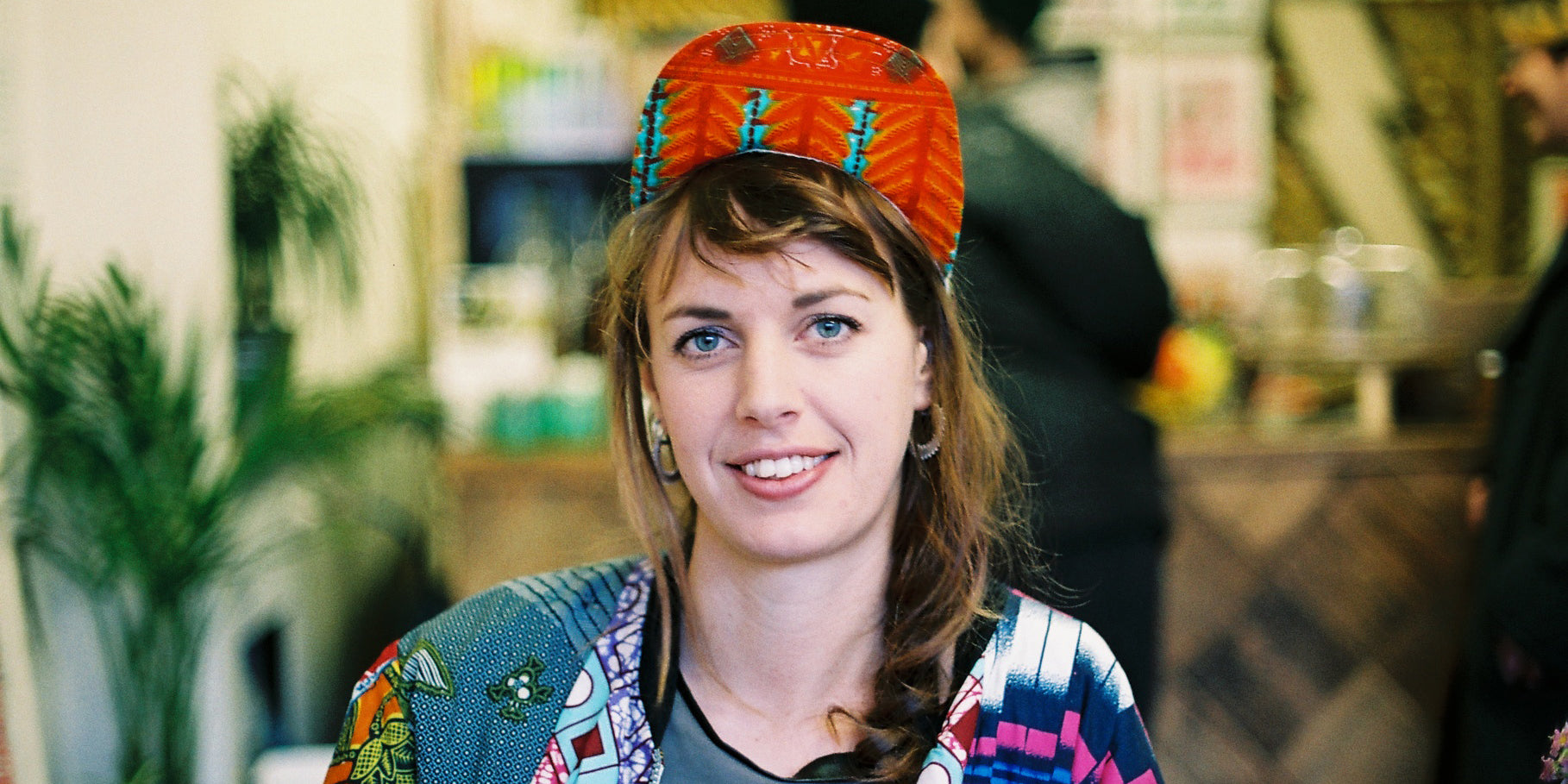Bristol is home to some ridiculously talented artists and self starters. For our second interview in the Characters of Culture series, we turn to a woman bringing colour to the West Country, Ruby Maya, to tell us about the origins of Ashanti Empress, and how Bristol keeps her inspired throughout the winter.
Read the original blog post from Friction Collective HERE.
Josie: Would you like to start with the origins of Ashanti – where did it all begin?
Ruby: So it started 10 years ago, I went to Ghana for the first time when I was 18 and worked on a volunteer project. I was living there for six months, and that’s when I started working with the school that Ashanti raises money for. I kept links with them when I came back to the UK and went to university in Sheffield. There I studied International Relations and Politics – which kind of links in a little bit with what I’m doing now.

Josie: Ah! I expected you would have studied fashion or something?
Ruby: No I very much fell into this. I started up a night called Ashanti Beats in Sheffield as a fundraiser for the school in Ghana. And through that raised lots of money for sponsorship and building new classrooms, and stuff like that. That’s kind of what kept me going back. That, and the connections that I had formed with people. This is before any of the fashion things happened. And now I’ve just started [Ashanti Beats] in Bristol. So after a five/
Josie: Are the nights focused around African music?
Ruby: Yeah, they are definitely African focussed, but we’re not bound to that, we play anything that makes you feel tropical and wanna dance! And the next one in April or May is going to be the launch of the new Ashanti Empress collection because I’m going to Ghana on Sunday! And it’s going to have
Josie: Sounds great! So how did all the clothing design begin?
Ruby: In 2015 I’d just moved to Bristol, it was winter, I working in a restaurant – hating it, it was just rubbish, and then one of my friends that I used to work with posted something on Facebook like “I’m going to Ghana, has anyone got any tips?” And having been there, I told her to “Go here, do this, do that..!” Then she asked why I didn’t just come, and so I quit my job and I went, and I went for a holiday. At the time I was kind of thinking of business ideas in the UK, about doing my own business but I didn’t know what I was gonna do.
And then when I was out there, I had the idea that OK well I make all my own clothes when I go there – I’m always designing clothes, buying all the fabrics and working with tailors anyway. And then when I’m in the UK people are like “oh my god I love your clothes!” So I thought OK maybe we can make this work somehow! So that first year I probably made about 50 things. I came back and sold it all. And then I was like, okay…this Is this could happen! That was from about £200 I put into it that first year, so a very minimal investment.
And then it’s just kind of built up from that really, so now since 2015 I’ve been back every year around this time to go and create new things. Over that time, I’ve made great connections with different tailors, so I now have a really great core team of tailors that I’m working with.


Josie: Wow that sounds fantastic, what are the kind of my systems of production in Ghana?
Ruby: Yeah. So in
So I have to walk around with little pieces of fabric in my hand showing all the women. It is something I really like about what I’m doing because I love going to the market and sourcing all the fabrics. And I also like that they’re original – sometimes you find this one off print that is amazing, and I’ll just buy it and make some crazy thing just because I like the print. But sometimes it’s really hard work. So yeah, it’s part of the fun, but it’s hard. And then the tailoring shops are usually based in small shipping containers where people set up their business. It’s not only tailoring shops – convenience shops, everything – they’re all just in these little shipping containers at the side of the road.
Josie: How many tailors do you have?
Ruby: I work with five tailoring shops, and amongst them, there are about 30 people, including the apprentices. All of it has been very much learning as I go, and trying to make

Josie: Have you noticed any changes in the lives of the tailors you work with in Kumasi?
Ruby: Yeah it’s quite considerable. Through working with the tailors that I’ve been working with now for about 3/4 years, I’ve seen their businesses grow and expand year on year. As Ashanti Empress is growing, their own businesses are growing. They’ve been able to buy their own shipping container shops instead of renting. Two of them have now bought their own shop, one of them has bought herself an industrial sewing machine so the quality of her sewing is a lot better. So, stuff like that, which is really really cool – to see that they’re being able to support themselves and their families, through knowing that income is coming in so they can plan ahead a little bit more.
Josie: And so you just gave up your studio here at Two’s Company, are you going to come back to it?
Ruby: No. Not really. Usually I just get a studio for a couple of months in the winter when I’m creating the new
Josie: That makes sense! When you do need a studio, how important is it to have an Artist space like this?
Ruby: Ruby: I think they’re really amazing. Part of why I get a studio in the winter is because I really struggle with working by myself all the time – it’s depressing. In terms of not having colleagues, a work team, or people to bounce ideas around with. Having a studio, like here at Two’s Company, and the Jam Jar a couple of years ago, are just a really great way to form collaborations with people.
Me and Sam (who runs Hidden Temple) are going to do an Ashanti Empress crossed with Hidden Temple bikini line. So these ideas just crop up because you get chatting about stuff with other creative people. You don’t know what kind of things might get born out of that. I think that the spaces in Bristol that allow for that to happen are really amazing spaces to be treasured for many people, especially young people of our generation. So many more people are self-employed, and just creating their own jobs now. And places like this enable people to still have a work environment but on their own terms and in a creative way.

Josie: Yeah definitely. While we’re on Bristol, what are your favourite places in Bristol in terms of community spaces & places you love?
Ruby: The Jam Jar. I Love it.
Josie: Why? How would you describe it to someone who’s never been?
Ruby: It’s just a place filled with really great people, really great vibes, great music, great community events. It brings together an open & accepting crowd of people that share nice times together. They’ve got studios, they run events, it definitely has that feel of being run by a community for the community – it’s not hierarchical or anything. So I really love it, and that’s why I’m always having my events there.

Josie: So when will your next Ashanti Beats night be there?
Ruby: I’m hoping sometime early May. And yeah like I said before there’s gonna be a
Josie: Awesome, sounds like a pretty fun year ahead!
Keep up with Ashanti Empress here and at @ashantiempress
Photographs and interview by Josie Rae
Check out the first Characters of Culture interview with Nick Hand here.
Big thanks to Friction Collective for the great write up!



